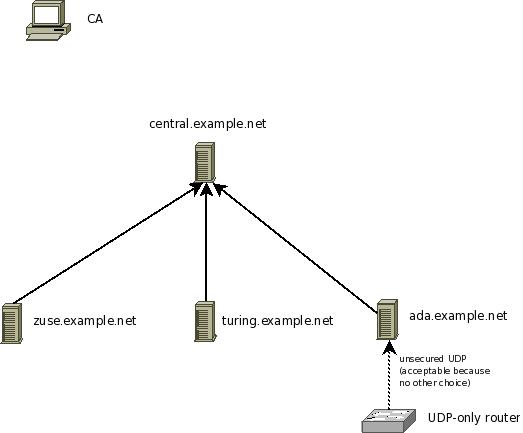
Written by Rainer Gerhards (2008-07-03)
In this step, we configure a client machine. We from our scenario, we use zuse.example.net. You need to do the same steps for all other clients, too (in the example, that meanst turng.example.net). The client check's the server's identity and talks to it only if it is the expected server. This is a very important step. Without it, you would not detect man-in-the-middle attacks or simple malicious servers who try to get hold of your valuable log data.

Steps to do:
At this point, please be reminded once again that your security needs may be quite different from what we assume in this tutorial. Evaluate your options based on your security needs.
Keep in mind that this rsyslog.conf sends messages via TCP, only. Also, we do not
show any rules to write local files. Feel free to add them.
# make gtls driver the default
$DefaultNetstreamDriver gtls
# certificate files
$DefaultNetstreamDriverCAFile /rsyslog/protected/ca.pem
$DefaultNetstreamDriverCertFile /rsyslog/protected/machine-cert.pem
$DefaultNetstreamDriverKeyFile /rsyslog/protected/machine-key.pem
$ActionSendStreamDriverAuthMode x509/name
$ActionSendStreamDriverPermittedPeer central.example.net
$ActionSendStreamDriverMode 1 # run driver in TLS-only mode
*.* @@central.example.net:10514 # forward everything to remote server
Note: the example above forwards every message to the remote server. Of course, you can use the normal filters to restrict the set of information that is sent. Depending on your message volume and needs, this may be a smart thing to do.
Be sure to safeguard at least the private key (machine-key.pem)! If some third party obtains it, you security is broken!
Copyright © 2008 Rainer Gerhards and Adiscon.
Permission is granted to copy, distribute and/or modify this document under the terms of the GNU Free Documentation License, Version 1.2 or any later version published by the Free Software Foundation; with no Invariant Sections, no Front-Cover Texts, and no Back-Cover Texts. A copy of the license can be viewed at http://www.gnu.org/copyleft/fdl.html.